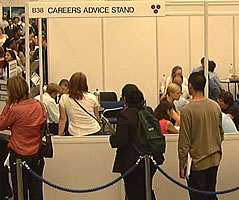

|
|
Study, work or travel in the UK. British
culture and life.
|
|
||
|
|
|
|
||
 |
||||
|
|
||||
 |
||||
|
Work
/ Search
|
||||
|
Finding a job vacancy in the UK
|
||||
|
Sections
|
Introduction |
 |
| Salary | ||
| Online | ||
| Using contacts | ||
| Job centres / employment agencies | ||
| Local search | ||
| Seasonal jobs | ||
| Jobs requiring languages | ||
| Newspapers | ||
| Graduate careers | ||
| Links |
In the UK there is a national minimum wage which you should be paid.
For further details, including how to complain if you are paid less than this,
see the tax authority's website: http://www.hmrc.gov.uk/migrantworkers/nmw.htm
In the year from October 2011:
- If you are aged 21 or over the minimum wage is £6.08 per hour
- If you are aged 18-20 the minimum wage is £4.98 per hour
- If you are aged 16 or 17 (and over the compulsory school age) the minimum
wage is £3.68 per hour
- Apprentice rate is £2.60 per hour
The minimum wage does not usually apply if you are doing voluntary work. If
accommodation is provided, the minimum wage may be reduced by a certain amount
(this is known as an "accommodation offset").
Back to top
One way of finding a job is to ask your friends if they know of somewhere
to work. Sometimes a friend will be working somewhere but will be leaving soon
or will know of someone else who is about to leave. Your friend may agree to
talk to the employer to recommend you for the job. The employer may be happy,
because it saves time and money to fill the position without advertising it,
and because your friend's recommendation suggests that you may be a reliable
worker.
You may also have other contacts either in the UK or in your home country
who can help you by giving you general advice, by checking your CV or application
form, by introducing you to someone, or by writing a reference or a letter of
recommendation for you. Think about the people who you know from your education,
work or social life.
Back to top
You may want to check if there are any suitable job vacancies at your nearest
Job Centre Plus. This is a place set up by the government to help people
to find work.
To find your nearest branch, see Yellow Pages at http://www.yell.com
(search for "Jobcentre Plus")
You can search their database for jobs on the website: http://www.direct.gov.uk/jobsearch
It may be worth registering with local recruitment agencies. Some of
these deal mainly with full-time jobs or with skilled part-time/contract jobs
(for example, office work).
You can find a recruitment agency using UpMyStreet: http://www.upmystreet.com.
Select Find My Nearest … , and find Employment & recruitment
agencies in your town/postcode.
You may also want to check Yellow Pages at http://www.yell.com
(specify "recruitment consulants").
Many part-time jobs are never advertised in newspapers or by using employment
agencies, especially if the job does not require uncommon skills or a lot of
previous work experience (typically, jobs such as a cleaner, waiter/waitress,
or a shop assistant). Visiting directly may be the best way of finding such
jobs.
You may want to go to shops (for example: a supermarket, bakery or clothes shop)
or places offering meals (tearooms, coffee shops, fast food shops, or restaurants),
accommodation (for example: hotels) or leisure services (for example: cinemas)
in the area where you want to work. You can make a list of suitable places by
using the FindMy Nearest tool from the UpMyStreet website: http://www.upmystreet.com.
Enter the postcode of your home or school; the places nearest to these will
be listed first. Part-time jobs may be offered by companies under categories
such as:
Eating & drinking : Pubs & bars, Restaurants
or Takeaway & fast food
Entertainment : Cinemas, Clubs & dancing, Sport
Hotels & guest houses : Camping sites, Guest houses,
Hotels, Youth hostels
Shopping : Clothing & footwear, Fashion shops,
Shopping centres & department stores
Some types of part-time job may require previous experience of that kind of
work. For example, if you have worked as a florist in your own country, you
may try all of the flower shops in the area you have chosen, starting perhaps
with the nearest ones.
Go into these places and say that you are looking for a part-time job. Ask a
member of staff how you can apply for a job there, and if possible ask if you
can speak to the manager (the person who can decide whether to give you a job).
If a shop or hotel is part of a larger company, you will probably have to complete
an application form and you may sometimes have to go to a central office for
an interview. Sometimes you may be able to apply for a job online directly from
the company's website.
There are also part-time jobs available working for a person at their home (for
example: cleaning, ironing, gardening or dog-walking). These types of jobs can
often be found by looking at personal adverts placed in the windows of newsagents'
shops, on noticeboards in supermarkets or in the library, or in local newspapers.
For information about work looking after someone's children, see the section
Course/Au Pair.
Back to top
There may be certain times of year when there is strong demand for a particular
service, so there may be opportunities for short-term or part-time jobs. For
example:
- Shops before Christmas (November/December) or at the time of their sales (often
in January and July)
- Hotels/tourist attractions/camps during the summer holidays (July/August)
- Farms at harvest time (often in July/August)
 |
Summer
Jobs in Britain 2007 Authors: David Woodworth, Guy Hobbs Publisher: Vacation Work Publications Date: November 2006 |
You may find that you can find a job more easily, or get a job with a higher
salary, if you work in a job which makes use of your ability to speak and write
your native language. However, if you are using your language all the time,
you will not learn much English while you are working.
Check the links in this website for your country. Choose Country from
the top menu and select your region and then country. Links to your country's
embassy in London or newsletters in the UK may be useful.
Here are some hints about how to find a job which requires your language skills:
- There is probably a directory of companies from your country which
are in the UK. Ask your country's embassy in London.
- There may be recruitment agencies which specialise in jobs for people
from your country or speaking your language.
- Your community in the UK may have a newsletter, perhaps with a website,
which will probably contain a section for job adverts. Look also at which companies
place advertisements for their services in these newsletters; this suggests
that these companies have many customers from your country.
- Look for adverts in local newspapers/jobs magazines or on UK jobs websites
which contain the name of your language or nationality (eg: France or
French), or which contain words such as bi-lingual or multi-lingual.
- You may also wish to ask shops which are popular with tourists from
your country if they have a part-time vacancy.
- Even if most customers are British, restaurants serving your nationality's
food want to employ staff from that country, partly because the manager may
find it easier to deal with you, and partly because it improves the image of
the restaurant.
- You might find some translation work from English into your language,
although this is likely to be contract work on a project rather than a full
job.
- Sometimes there are opportunities for telephone sales or marketing
work for a company wishing to sell its products abroad.
- You may be able to find work teaching your language to English people,
perhaps on a one-to-one basis. Doing a language exchange (the person
teaches you English, and you teach your language) will not get you any money,
but will be a free way of improving your English.
Back to top
Another place to check for jobs is the local newspapers. You may find
specialist jobs/small ads newspapers in a newsagent's shop.
When looking in job advertisements, these are some of the abbreviations you
may see:
£ pay; CV curriculum vitae (resumé); d/l driving
licence; exp experience; f/t full-time; k thousand pounds;
neg negotiable; n/s non-smoker; OTE opportunity to earn
(often used in jobs where pay depends on your sales success); p/t part-time;
pa per annum; ph per hour; pw per week; refs references;
wks weeks
Back to top
If you are studying at a UK university, visit the university careers centre
for information and advice about finding a career after you have finished your
course. The careers centre may also be able to provide advice about finding
a work placement or part-time or holiday jobs. If your visa does not allow you
to work in the UK, you may still find there is useful information to help you
to decide what you will do after you have returned to your country, as well
as information on further study opportunities in the UK. For further information,
including links to the websites of the careers centres in the universities,
see: http://www.prospects.ac.uk.
Universities often organise careers fairs in the autumn or spring terms,
when employers visit the university and explain about job opportunities in their
companies.
In London, events include the London Graduate Recruitment Fair in June
and October (see: http://www.londongradfair.co.uk).
For a list of events organised by the University of London Careers Service (ULCS),
see: http://www.careers.lon.ac.uk
 A careers fair |
 Queuing for careers advice |
|
|
|